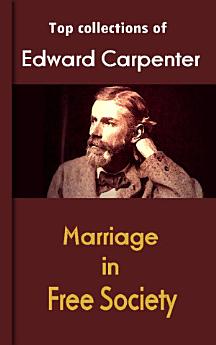Marriage in Free Society: Carpenter's Sociology
About this ebook
Compared with this, the actual marriage, in its squalid perversity as we too often have occasion of knowing it, is as the wretched idol of the savage to the reality which it is supposed to represent; and one seems to hear the Aristophanic laughter of the gods as they contemplate man's little clay image of the Heavenly Love—which, cracked in the fire of daily life, he is fain to bind together with rusty hoops of law, and parchment bands, lest it should crumble and fall to pieces altogether.
The whole subject, wide as life itself—as Heaven and Hell—eludes anything like adequate treatment, and we need make no apology for narrowing down our considerations here to just a few practical points; and if we cannot navigate upward into the very heart of the matter—namely, into the causes which make some people love each other with a true and perfect love, and others unite in obedience to but a counterfeit passion—yet we may fairly, I imagine, and with profit, study some of the conditions which give to actual marriage its present form, or which in the future are likely to provide real affection with a more satisfactory expression than it has as a rule to-day.
Ratings and reviews
About the author
Edward Carpenter (29 August 1844 – 28 June 1929) was an English socialist poet, philosopher, anthologist, and early LGBT activist.
A leading figure in late 19th- and early 20th-century Britain, he was instrumental in the foundation of the Fabian Society and the Labour Party. A poet and writer, he was a close friend of Rabindranath Tagore, and both friend and lover of Walt Whitman. He corresponded with many famous figures such as Annie Besant, Isadora Duncan, Havelock Ellis, Roger Fry, Mahatma Gandhi, James Keir Hardie, J. K. Kinney, Jack London, George Merrill, E D Morel, William Morris, E R Pease, John Ruskin, and Olive Schreiner.
As a philosopher he is particularly known for his publication of Civilisation, Its Cause and Cure in which he proposes that civilisation is a form of disease that human societies pass through. Civilisations, he says, rarely last more than a thousand years before collapsing, and no society has ever passed through civilisation successfully. His 'cure' is a closer association with the land and greater development of our inner nature. Although derived from his experience of Hindu mysticism, and referred to as 'mystical socialism', his thoughts parallel those of several writers in the field of psychology and sociology at the start of the twentieth century, such as Boris Sidis, Sigmund Freud and Wilfred Trotter who all recognised that society puts ever increasing pressure on the individual that can result in mental and physical illnesses such as neurosis and the particular nervousness which was then described as neurasthenia.









